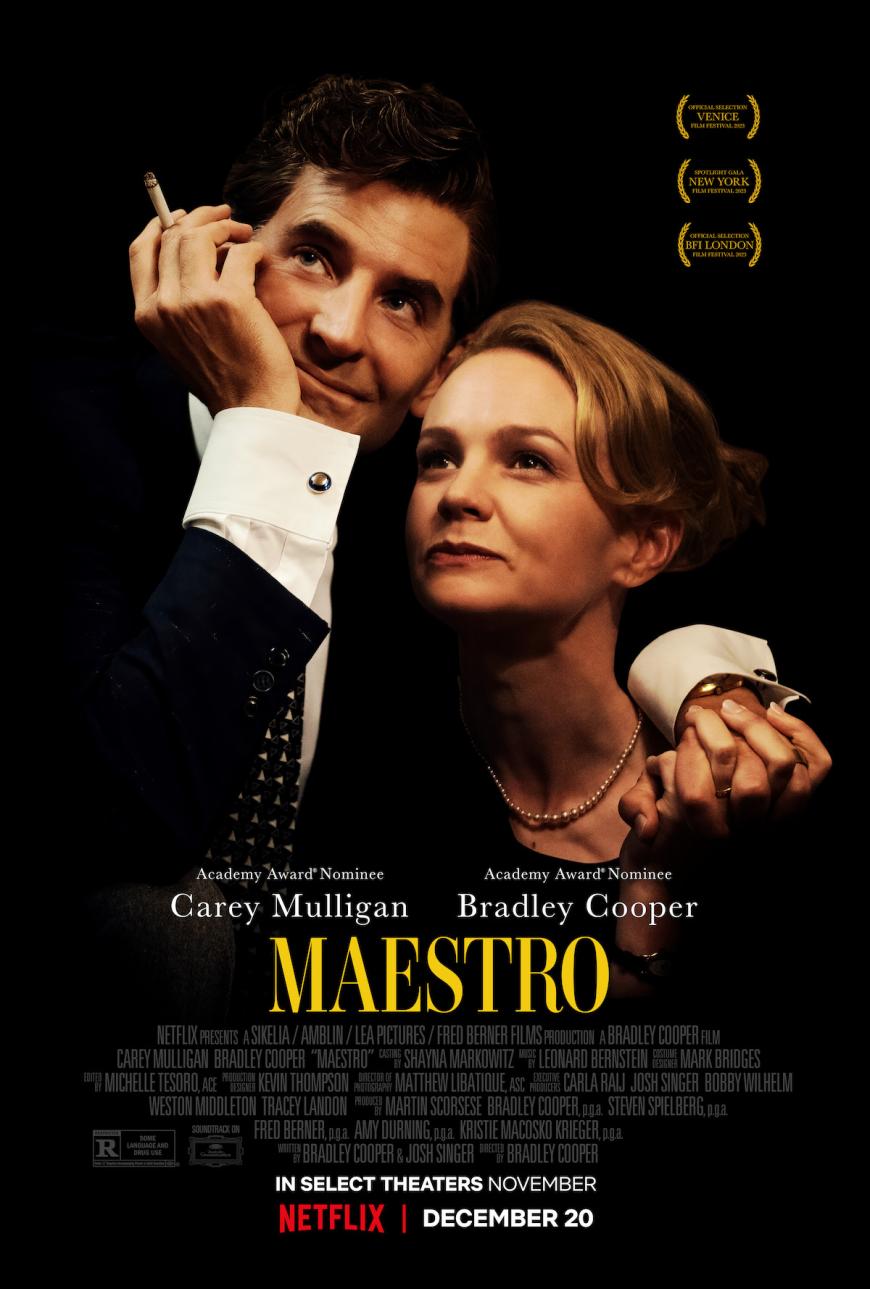
Long anticipated and much discussed, Maestro, the Leonard Bernstein biopic, is coming to theaters this week and will be streaming on Netflix, which produced the film, beginning Dec. 20.
Neither an exposé nor a hagiography, Maestro depicts the passionate, stormy, and deeply troubled 25-year-long marriage between the bisexual and often rapacious Bernstein and the actress Felicia Montealegre.
Maestro is Bradley Cooper’s “one-man project,” similar to Charlie Chaplin’s solo adventures as writer, director, composer, and star nearly a century ago. Cooper is Maestro’s director, co-producer (with Steven Spielberg, Martin Scorsese, and others), co-writer (with Josh Singer), and title-role star as Bernstein.
Not incidentally, and as the movie frequently emphasizes, Bernstein was a protean figure as conductor, composer, author, lecturer, humanitarian, and prominent public figure. Yet between Bernstein’s and Cooper’s multifaceted talents, Maestro has a deliberately narrow focus on an unusual marriage.

As Cooper himself has said, the film is not meant to be a “traditional musical biopic,” such as Rocketman or Bohemian Rhapsody, but rather “a movie about marriage.”
Leo Tolstoy may have written that “happy families are all alike; every unhappy family is unhappy in its own way,” but happiness and unhappiness are never and nowhere exclusive, and they are mixed to an extreme in Maestro.
Maestro arrives at a time when movie studios are turning their attention to sacred monsters in the world of classical music — long after the surge of Beethoven films, which ranged from a dozen sagas about the composer (like Immortal Beloved and Eroica) to an eponymous St. Bernard.
With the recent controversy over Tár and the upcoming release of a Maria Callas biopic starring Angelina Jolie, Maestro is likely to be grist for the mill of ongoing debates among audiences, especially those who spent years watching and listening to Bernstein.
For music fans, there are many potential problems among the footnote-like references to Bernstein’s work in the film, but there is one major scene that would undermine even a better movie than Maestro. Near the end of the film — and before the painful portrayal of Montealegre’s fatal bout with cancer — Cooper acts as Bernstein at his most histrionic, conducting Gustav Mahler.
Throughout the rest of the film, Cooper looks and sounds like Bernstein, from age 30 to the musician’s death in 1990 at age 72, with surprising authenticity. Where Cooper fails, in a cringeworthy miscalculation, is trying to portray the unique duality of Bernstein’s conducting.
Always a showman, Bernstein had an athleticism on the podium that was meant to impress the audience, but it was also, and more importantly, an expression of the “music flowing through his body” and carrying the orchestra with him. (At a closed, audience-free rehearsal of Fidelio with the RAI Orchestra at the Foro Romano in the 1970s, I watched Bernstein bring miracles out of the orchestra, still posing for the musicians but free of playing to those behind him in the empty auditorium.)
When Cooper plays Bernstein in the recreation of a famous 1973 concert recording with the London Symphony Orchestra in Ely Cathedral in Mahler’s heaven-storming Symphony No. 2, only the poseur is seen. There’s no real connection with the music.
A curious decision for the concert segment is using a new recording by Yannick Nézet-Séguin conducting the LSO in Ely Cathedral rather than the Bernstein original, perhaps in consideration of the sound quality. A debatable choice.
The standout in the cast is Carey Mulligan as Montealegre, with an unselfconscious presence, the opposite of Cooper on the podium, appealingly subtle and believably natural.
In the crew, Kevin Thompson’s production design is a mixed blessing, with unusual angles and some perspectives calling attention to themselves; Mark Bridges’s costume designs keep up with the times between the 1940s and 1990 — meeting a great challenge.
And finally, back to the film’s handling of Bernstein’s bisexual exploitations in an era far before #MeToo, something “everybody knew about” but nobody, not even the supermarket tabloids, mentioned. Maestro shows scene after scene of Bernstein leaning over, courting, and grabbing young men who are subordinate to him and rarely resisting.
Bernstein’s friends and wife tolerate the behavior, even when he tells a couple, two old friends, that “I slept with both of you.” They laugh. In one scene, Bernstein is seen at one of his frequent and historically consequential conducting lessons, both teaching and keeping the student in a tight embrace.
Perhaps even more than what is in the film, the main criticisms will be about what’s missing, regardless of Cooper’s stated intention: a more complete picture of a complex man, one of the 20th century’s greatest musicians.
Just one aspect of what made Bernstein such a towering figure was his tremendous work popularizing classical music, especially among young people — the audiences of the future. A film portrayal might have paid more attention to Bernstein’s own use of mass media, such as radio and television, to introduce and “sell” classical music to millions.
Hard as that challenge may be, one of Bernstein’s famous mentees, Michael Tilson Thomas, achieved that balance repeatedly, presenting a “complete picture” of the life and work of various composers in the San Francisco Symphony’s Keeping Score series.




